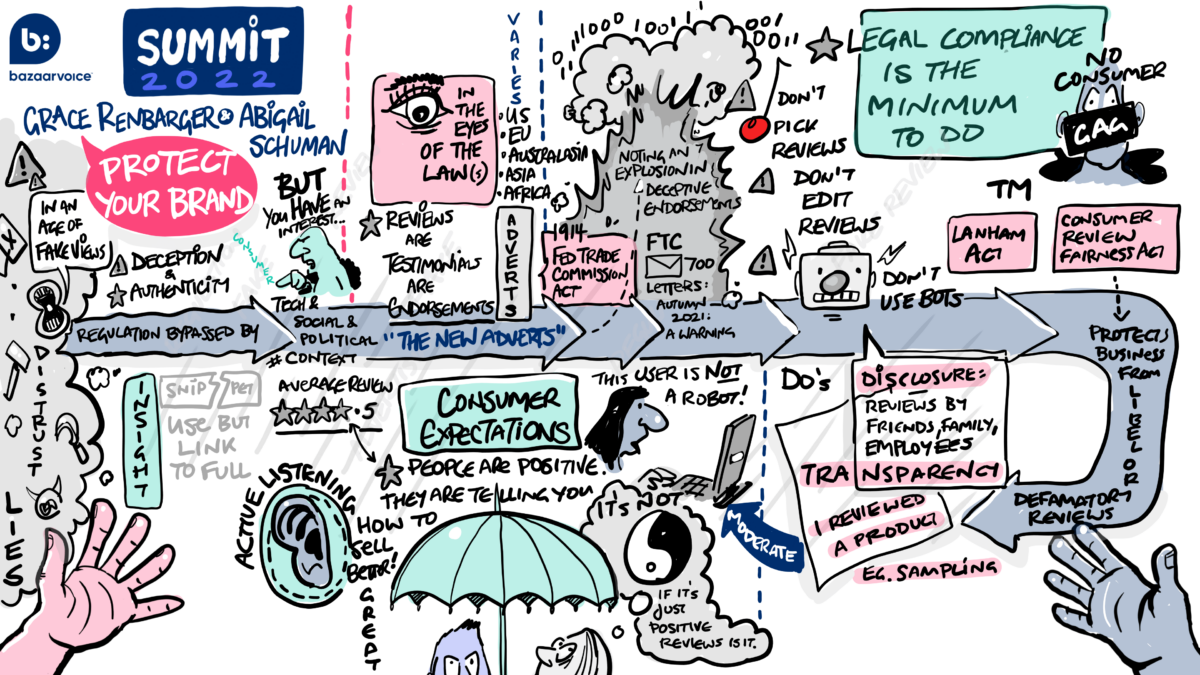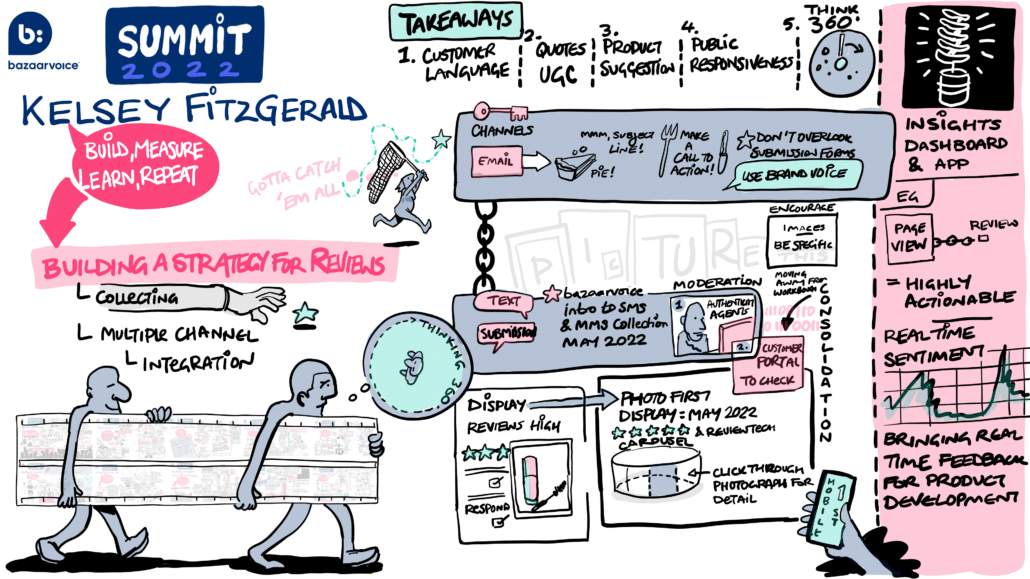April 7, 2022
These are live-blogged notes and sketches from a Bazaarvoice Summit session, delivered by Gracie Renbarger, Senior VP and General Counsel, and Abigail Schuman, Senior Director, Content Services at Bazaarvoice, on April 7th, 2022. The rest of our Summit content can be found here.
There’s growing distrust out there about the internet and news — but this is bleeding into distrust of reviews. A worrying 73% of consumers feel that the retail industry needs a new set of standards to combat fake reviews.
Why should you care? Well, bluntly, consumers trust reviews more than they trust you. 78% of people trust reviews, but only 33% trust what you say. You, after all, have a material investment in what you say is positive about your products. If people suspect you have fake reviews, it undermines their trust in all the reviews on your site, and that leads to concerns about purchasing from you.
And then, there are legal issues as well…
When brands and retailers use user-generated content (UGC) as part of their marketing, it becomes a form of advertising. And so, it is going to be subject to government legislation and laws. There’s a variety of laws in diverse jurisdictions, all of which aim to protect customers from deceptive reviews.
We’ll cover the US laws here and provide advice for protecting your brand, but only in general terms — do seek your own legal advice for your specific cases, and we’re working on future blog posts on these topics so keep an eye on the BV blog.
The Federal Trade Commission Act
This is a 1914 law, that’s still relevant today, and prohibits unfair methods of competition and deceptive practices in things, including advertising. The FTC both enforces and interprets the law, and provides a document you can download called Guides concerning the use of Endorsements and Testimonials.
Since the guidelines were established in 2009, there’s been an explosion in consumer reviews and social content, blurring the line between advertising and customer content, and a boom in deceptive practices. The FTC is stepping up enforcement, with 700 companies warned about their customer review practices, which could be in violation of the FTC act.
These letters don’t mean that the FTC thinks the companies are in violation of the law. They’re just putting companies on notice that if they use deceptive practices in the future, they’ll face potential financial penalties: Up to $43,792 per violation.
Here’s how to avoid running into issues:
Don’t:
- Cherry-pick reviews: Don’t just collect or display positive reviews. Treat all reviews the same.
- Post or allow fake reviews: These are inauthentic reviews, by someone who has never used the product, or someone who created multiple fake reviews. If the company edits a real review to change its sentiment, that counts as fake. And, of course, bot reviews are fake. Bot services are illegal, and the FTC will target US-based ones but will go after US companies that use overseas ones, too.
A cosmetics band got into trouble with the FTC for encouraging their employees to write fake reviews of their products.
Pro tip: always use a UGC provider that does verification processes — like Bazaarvoice!
Do:
- Disclose any material connection between the reviewer and merchant: The FTC expects reviews to be written by real people with real experiences of the product. So, if you have a relationship with the reviewer, it needs to be disclosed. That applies to employees, friends, and families.
- Disclose any material benefit provided to the reviewer: For example, a sampling campaign, or a straight payment to an influencer. Anything that is of material benefit counts, and needs to be disclosed. There’s no standard verbiage, but it needs to be clear to the reader of the review — and it needs to be conspicuous. Hiding it at the end of the review wouldn’t be conspicuous.
A fashion brand was fined $4.2 million for suppressing negative reviews.
The FTC provides guidance around this topic.
The Lanham Act
This law allows for lawsuits by private individuals, for the same issues as the FTC act. It also allows competitors to sue each other for deceptive practices.
Examples of this include Vitamins Online, Inc. v. Heartwise Inc, or EIS vs. Novoluto.
The Consumer Review Fairness Act
This outlaws companies from using gag clauses to prohibit customers from writing reviews, or using clauses that claim copyright over people’s reviews, allowing negative ones to be pulled down.
To stay on the right side of this one:
Don’t:
- Prohibit customers from writing reviews by an outright ban, non-disclosure provisions, or advance assignment of copyright
Do remove UGC that:
- Reveals confidential information
- Contains content that is libellous, harassing, abusive, obscene, vulgar, sexually explicit, inappropriate with respect to race, gender, sexuality, ethnicity, or other intrinsic characteristics
- Is unrelated to the company’s products or services
- Is clearly false or misleading, malicious or defamatory
Tenets of authenticity
Trust comes down to empathy. Dealing with this authentically is all about having empathy for consumers. We deal with issues of honesty and authenticity to build trust with consumers. They rely on the reviews to give them a sense of goods they can’t touch, hold or play with before they buy it, as we’ve all discovered through the pandemic.
Don’t worry about airing your dirty laundry. The average star-rating tends to be about 4.5 stars. And what negative feedback there is endorses the authenticity of your site. Not everyone likes the same stuff. Showing only positive reviews creates the impression of dishonesty.
Besides, accepting product feedback and learning from it can improve your business. Very specific negative product feedback is easy to look at, explore and fix. These are customers already in your funnel, so they’re telling you how you can make it easy for them to spend more money with you.
This is why we encourage you to respond to reviews within our tools.
Authenticating content
- Is this clearly a real person? Do I have enough to show me that is the case?
- Do they have real product experience? Again, does the review make that clear?
Informing consumers
- Is there anything about the relationship that should be disclosed?
To enable this, Bazaarvoice uses world-class ground prevention tools, very similar to those used by banks.
Facing the future
This is a new space, with rapidly evolving legislation and customer expectations. So, we at Bazaarvoice make sure we have good relationships with legislators, but we also survey consumers regularly. And then, we allow those discussions and surveys to influence our roadmaps.
For example, one of the things Abigail is thinking about is the acceptable level of editing in social images.
UGC is clearly going to grow, so we need to keep working on this. Always put yourself in the consumer’s shoes — and make sure you provide the information you would expect. Legal compliance should be the bare minimum, go beyond that to build trust with the consumer. There’s no better method for protecting your brand.
The retail industry is as strong as ever. And consumers hold the power like never before. They decide how a brand is perceived, and the risk of boycott in today’s cancel culture is very real. The dramatic power shift to customers has led to heightened actions and vocalizing for authenticity, improved experiences, and above all, for consumers to feel heard. Catch up on Bazaarvoice Summit to see how to win hearts and minds of today’s consumers.








